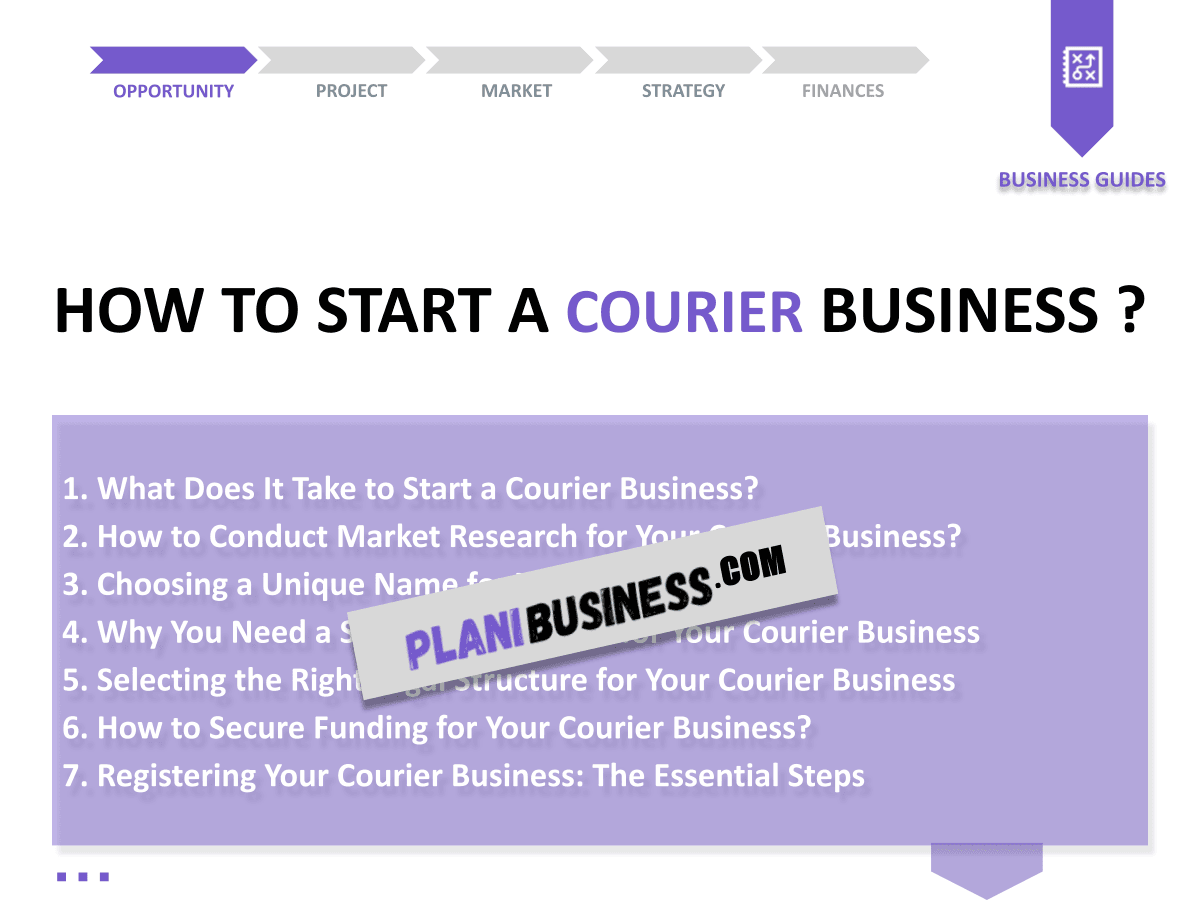Are you considering launching your own business? You’re not alone! The courier industry has seen remarkable growth, with many entrepreneurs eager to dive into this lucrative market. In fact, the demand for delivery services has surged by over 20% in recent years, driven by the rise of e-commerce and the need for fast logistics solutions. How to Start a Courier business involves understanding the ins and outs of the logistics world and preparing to meet customer needs effectively. In this article, we will guide you through the essential steps to help you establish a successful courier service.
- Discover what it takes to start your courier business.
- Learn the importance of market research and how to conduct it.
- Understand the significance of a solid business plan.
- Explore the legal structures available for your courier service.
- Find out how to secure funding and manage your finances.
- Get tips on marketing and building your brand identity.
1. What Does It Take to Start a Courier Business?
Starting a courier business requires more than just a vehicle and a desire to deliver packages. It takes planning, research, and a clear understanding of the logistics involved. The first step is to identify your niche in the delivery market. Are you focusing on local deliveries, express services, or perhaps specialized deliveries for businesses? Understanding your target market is crucial to shaping your business.
- Identify the type of courier service you want to offer.
- Research local demand for different courier services.
- Analyze competitors and find your unique selling proposition.
Consider what makes your service different from others. Maybe you offer same-day delivery or specialize in fragile items. Whatever it is, make sure it resonates with your target audience. This will not only help you attract customers but also establish a strong brand presence in the market.
2. How to Conduct Market Research for Your Courier Business?
Market research is essential when considering how to start a courier business. You’ll need to gather data on potential customers, competitors, and market trends. This research will guide your decisions and help you understand the landscape of the courier industry.
| Research Method | Description |
|---|---|
| Surveys | Gather feedback from potential customers on their delivery needs. |
| Competitor Analysis | Study your competitors’ services, pricing, and customer reviews. |
| Industry Reports | Look for reports on courier trends and market projections. |
Start by conducting surveys or interviews with potential customers to understand their preferences and pain points. This first-hand information will provide valuable insights into what services you should offer. Additionally, keep an eye on your competitors; knowing their strengths and weaknesses can help you position your courier service effectively.
3. Choosing a Unique Name for Your Courier Business
Your business name is the first impression customers will have. It should be memorable, reflect your services, and be easy to spell. Consider using keywords related to delivery or logistics to enhance SEO. A good name can help with brand recognition and customer trust.
- Brainstorm a list of potential names that resonate with your services.
- Check domain availability for your website to ensure a strong online presence.
- Get feedback from friends or potential customers to gauge their reactions.
When selecting a name, think about your target market. Does your name suggest speed, reliability, or specialty services? A name that captures the essence of your business can make a lasting impact. Avoid overly complex names; simplicity often wins.
4. Why You Need a Solid Business Plan for Your Courier Business
A well-structured business plan is essential for any startup, including a courier service. It outlines your goals, strategies, and financial projections. Not only does it guide you, but it’s also crucial for attracting investors or securing loans. A solid business plan will help you navigate the ups and downs of starting your business.
Your plan should include sections on market analysis, operational plans, and financial forecasts. Here’s a quick overview of what to include:
| Business Plan Section | Description |
|---|---|
| Executive Summary | A brief overview of your business and its goals. |
| Market Analysis | Insights into your target market and competition. |
| Operational Plan | Details on how you will run your courier service. |
| Financial Projections | Forecasts for revenue, expenses, and profitability. |
I recommend checking out this business plan template for Courier. It’s super detailed and can save you a ton of time! Having a clear roadmap will keep you focused and help you make informed decisions as you grow your business.
5. Selecting the Right Legal Structure for Your Courier Business
Choosing the right legal structure affects your taxes, liability, and business operations. You can choose between sole proprietorship, LLC, or corporation, depending on your needs. Each structure has its own set of advantages and disadvantages that can impact your courier business.
| Structure Type | Pros | Cons |
|---|---|---|
| Sole Proprietorship | Easy to set up and manage | Unlimited personal liability |
| LLC (Limited Liability Company) | Limited liability and flexible management | More paperwork and fees |
| Corporation | Ability to raise capital through stock | Complex regulations and higher costs |
Consider your long-term goals when choosing a structure. If you plan to grow significantly, an LLC or corporation may offer better protection and opportunities. Consult with a legal professional to ensure you make the best choice for your courier service.
6. How to Secure Funding for Your Courier Business?
Funding is crucial for launching your courier service. Consider personal savings, loans, or investors. It’s important to have a clear budget and financial plan to show potential lenders or investors. Without adequate funding, even the best business ideas can struggle to take off.
- Calculate your startup costs, including vehicles, equipment, and marketing.
- Prepare a financial plan for the first year that outlines expected revenues and expenses.
- Explore different funding options available, such as small business loans or crowdfunding.
When approaching lenders or investors, be ready to present your business plan confidently. Highlight the potential for growth in the courier industry, backed by your market research. A compelling pitch can make a significant difference in securing the funding you need to start your business.
7. Registering Your Courier Business: The Essential Steps
Once you have your business plan and funding, it’s time to register your business. This step makes your courier service official and allows you to operate legally. Registration requirements can vary by location, so it’s important to research the specific rules in your area.
Steps to Register: 1. Choose your business name and ensure it’s not already in use. 2. File the necessary paperwork with your state or local government. 3. Obtain an Employer Identification Number (EIN) from the IRS. 4. Register for any applicable state or local taxes.
Completing these steps not only legitimizes your business but also helps establish credibility with potential customers. Having your business registered can also open doors to various funding opportunities, as lenders often require proof of registration.
8. Navigating Licenses and Permits for Your Courier Business
Depending on your location, you may need specific licenses and permits to operate legally. Research local regulations and ensure compliance to avoid fines. The courier industry can be heavily regulated, especially when it comes to transportation and delivery.
- Check local business regulations to determine what licenses you need.
- Obtain necessary permits for transportation, especially if you’re carrying hazardous materials.
- Stay updated on changing laws in the logistics industry to remain compliant.
Some common licenses you might need include a business license, a transportation license, and possibly a commercial driver’s license (CDL) if you’re operating larger vehicles. It’s crucial to understand these requirements early on to avoid any legal issues down the road.
9. The Importance of Insurance for Your Courier Business
Insurance protects your business from potential risks. As a courier service, you’re exposed to various liabilities, from vehicle accidents to lost or damaged packages. Having the right insurance coverage is essential to safeguard your assets and ensure the longevity of your business.
| Insurance Type | Coverage |
|---|---|
| Liability Insurance | Covers injuries and damages to third parties during your operations. |
| Vehicle Insurance | Covers your delivery vehicles against accidents and damages. |
| Cargo Insurance | Covers loss or damage to the items you deliver, ensuring client satisfaction. |
When selecting insurance, consider your business model and the types of goods you’ll be transporting. Consulting with an insurance agent who specializes in commercial coverage can help you find the best policies for your needs. This investment in insurance will provide peace of mind and protect your business from unexpected financial burdens.
10. Setting Up Financial Management Systems for Your Courier Business
Good financial management is key to the success of your courier business. Implementing effective accounting practices helps you track expenses, revenues, and profits, which is crucial for making informed decisions. Without proper financial oversight, you could face cash flow issues or miss out on growth opportunities.
- Choose accounting software that suits your needs and budget.
- Set up a separate business bank account to manage finances easily.
- Regularly review your financial performance to identify trends and adjust strategies.
Consider hiring a professional accountant or bookkeeper, especially as your business grows. They can provide valuable insights and help you navigate tax obligations. Establishing a solid financial foundation early on will set you up for success and enable you to scale your courier business effectively.
11. Building Your Brand Identity as a Courier Business
Your brand identity sets you apart from competitors and helps you connect with customers. A strong brand conveys reliability, professionalism, and the unique value your courier service offers. Creating a cohesive brand identity involves several elements, from your logo to your marketing materials.
- Design a professional logo that represents your business values.
- Create marketing materials, such as business cards and flyers, that reflect your brand.
- Engage with customers on social media to build relationships and enhance your brand visibility.
Consider the color scheme and typography you choose; they should resonate with your target audience. A consistent brand voice across all platforms, whether it’s on your website or social media, helps build trust and recognition. Remember, your brand is more than just a logo; it’s the experience you provide to your customers.
12. How to Market Your Courier Business Effectively?
Marketing is essential for attracting customers to your courier service. Without effective marketing strategies, your business may struggle to gain visibility in a competitive market. Utilize both online and offline strategies to reach your target audience effectively.
- Use social media platforms to promote your services and engage with potential customers.
- Consider local advertising options, such as community bulletin boards and local newspapers.
- Offer promotions or discounts to attract new customers and encourage repeat business.
Implementing SEO strategies on your website can also improve your online visibility. Use keywords related to how to start a courier and optimize your content to rank higher on search engines. Additionally, consider partnerships with local businesses to expand your reach and enhance your reputation in the community.
13. Assembling Your Team for a Successful Courier Business
Having the right team is crucial for your courier service. Your employees are the face of your business, and their performance directly impacts customer satisfaction. Hire reliable drivers and support staff who share your vision and values.
- Define roles and responsibilities clearly for each team member.
- Implement training programs for new hires to ensure they understand your company’s standards.
- Foster a positive work culture to retain employees and encourage high performance.
Consider offering incentives for excellent performance, such as bonuses for timely deliveries or customer compliments. A motivated team can significantly enhance your service quality and contribute to the overall success of your courier business. Remember, investing in your team is investing in your business’s future.
Conclusion
Starting a courier business can be an exciting and profitable venture. By following the steps outlined in this article, you can lay a strong foundation for your business and position yourself for success. Remember to conduct thorough market research, create a solid business plan, and build a strong brand identity to attract customers. Don’t forget the importance of assembling a reliable team and implementing effective marketing strategies.
For further insights, I encourage you to explore our articles on creating a SWOT analysis for your courier business at this link and learn how to develop a comprehensive courier marketing plan with examples at this link. These resources will provide you with valuable tools to enhance your courier service and stand out in a competitive market.
FAQ
- What is the first step to starting a courier business?
The first step is to conduct thorough market research to understand your target audience and competition. This will help you identify your niche and define your services. - Do I need a business license to operate a courier service?
Yes, most regions require a business license and potentially additional permits to operate legally. It’s important to check local regulations for specific requirements. - How can I find customers for my courier business?
Utilize online marketing, social media, and local advertising. Networking with local businesses can also help you gain clients and build relationships. - What types of insurance do I need for a courier business?
Essential insurance types include liability insurance, vehicle insurance, and cargo insurance to protect your business and assets from potential risks. - How much does it cost to start a courier business?
Startup costs can vary widely depending on your business model, vehicle costs, and marketing expenses. It’s crucial to create a detailed budget to estimate your initial investment. - Can I operate a courier service from home?
Yes, many courier services start from home, especially if you’re focusing on local deliveries. As your business grows, you may consider renting office space. - What vehicles do I need for a courier service?
The vehicles you choose will depend on the types of deliveries you plan to make. A reliable van or truck is often necessary for larger deliveries, while smaller vehicles can suffice for local packages. - How do I manage deliveries effectively?
Implement route optimization software to enhance delivery efficiency. Regularly training your drivers on best practices can also improve service quality. - Is it necessary to have a website for my courier business?
Having a professional website is highly recommended as it helps establish your online presence, showcases your services, and allows customers to contact you easily. - How can I differentiate my courier service from competitors?
Focus on providing exceptional customer service, offering unique delivery options, or specializing in niche markets to stand out from the competition.







